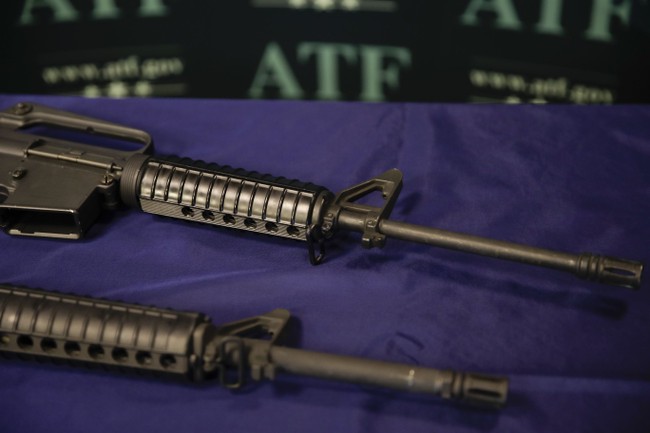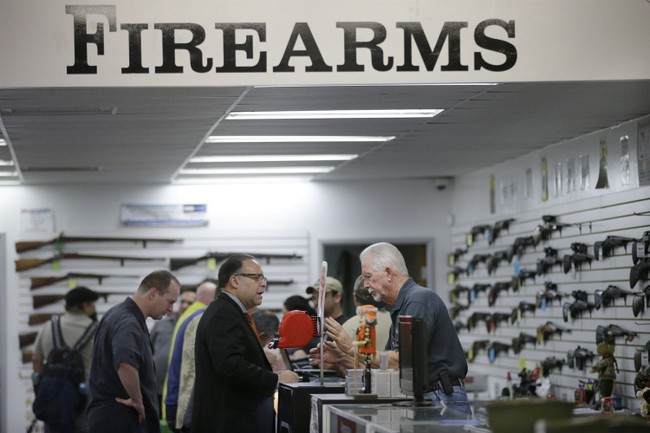
Unserialized firearms being built in people's garages makes a lot of people uncomfortable. After all, if people can make their own guns, the wrong sort of people can make their own guns as well.
Advertisement
Now, let's understand that people have been building their own firearms since before this nation was this nation, but now it's easier. We also know that the Supreme Court is going to hear a case involving the Biden administration's executive action on so-called ghost guns.
So anti-gun media outlets are going to offer up opinions. Vox, for example, was never going to ignore this one, and with a headline like, "A new Supreme Court case seeks to make it much easier for criminals to buy guns," you know it's going to be chock full of rationality.
But headlines are sometimes the result of the editor, not the author, so let's see what the word is from the story itself.
The Supreme Court announced on Monday that it will hear Garland v. VanDerStok, a case that could open up a massive loophole in US gun laws, effectively neutralizing federal laws requiring gun buyers to submit to a background check, and also requiring guns to have a serial number that law enforcement can use to track them.
OK, so it's pretty much on par with the headline.
Good to know.
Let's understand that there is no loophole. A loophole is a quirk in the law that allows someone to do something legally that they otherwise might not. If you're not allowed to own a gun, you're not allowed to lawfully build a gun. That's not a loophole.
Moving on.
The laws mandating background checks and serial numbers apply to “any weapon ... which will or is designed to or may readily be converted to expel a projectile by the action of an explosive.” It also applies to “the frame or receiver of any such weapon,” the skeletal part of a firearm that houses other components, such as the barrel or trigger mechanism. Thus, even if someone purchases a series of firearm parts to assemble a gun at home, they will still face a background check when they purchase the gun’s frame or receiver.
According to the Justice Department, it is often trivially easy to convert a ghost gun kit’s incomplete frame into a fully operational one. For example, some kits allow a ghost gun buyer to build a working firearm after drilling a single hole in the kit’s frame. Others merely require the user to sand off a small plastic rail.
So ghost guns are a fairly obvious effort to evade federal gun regulations by selling weapons that are about 99 percent complete, and then claiming that they do not meet the federal definition of a firearm subject to certain laws.
Advertisement
That's because they don't meet that definition.
First, they're typically more like 80 percent complete, though the ATF doesn't draw that line. The official word is that it's either ready to be assembled as a firearm or it's not a receiver. If they decided that anything that just needs a few holes drilled is also a receiver, someone will make an incomplete example that requires a bit more than that.
The truth is that while these receivers are not "trivially easy" to complete, regardless of what the Justice Department tries to claim, though they're also not extremely difficult to finish, either.
What's more, people don't need incomplete receivers in order to build their own firearms. They can take a block of metal and mill out a receiver or 3D print one.
I mean, you can build a submachine gun out of parts you got at a hardware store.
"But it's about bypassing federal gun regulations!"
And no one but a criminal would want to do that, right?
Wrong.
If I go into a gun store and buy a gun, it creates a paper trail. The Form 4473 is filled out and kept on file. If the gun store goes out of business, those records are forwarded to the ATF, an agency that keeps trying to digitize those records, thus creating a backdoor gun registry. A lot of people don't trust the ATF, and for good reason.
What's more, criminals may buy "ghost guns" from time to time, but the lion's share of what is recovered by law enforcement are more traditionally manufactured guns, generally stolen from their original owner. It should be noted that we also don't know how many "ghost guns" were actually stolen from the builders versus sold illegally.
Advertisement
Restricting kits and incomplete receivers won't really bother the criminals.
"But we can't trace ghost guns."
Son, you can't trace an awful lot of guns used in crime anyway. This whole "tracing" thing is overhyped. It may help identify straw buyers or people who lawfully bought a gun before becoming a criminal, but those are a small percentage of total guns used in criminal actions. Most are stolen and many others were sold numerous times lawfully before being stolen, meaning the original buyer--the name that will come up in a trace--has no clue what happened to the gun.
So let's not get too excited by tracing.
The truth of the matter is that these guns have been around for decades. It's only now that it's suddenly a problem, but Vox fails to note that before the media started making a thing about them, literally no one outside of the gun community knew they were a thing. That includes criminals.
Maybe what we need is a media that isn't so alarmist and doesn't feed ideas to criminals, rather than restrictions on gun that criminals might use illegally instead of a different gun.
















